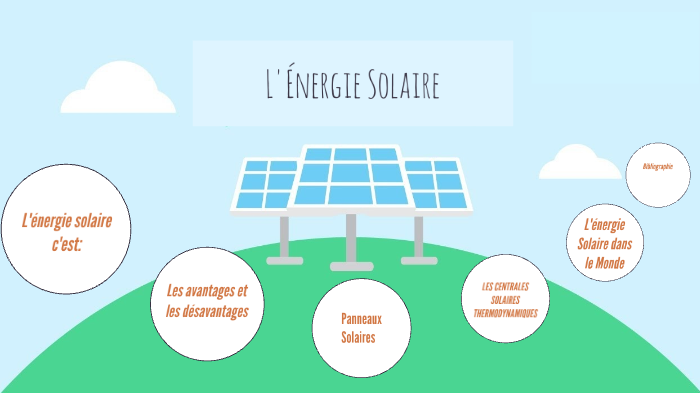Electricity Production
Solar energy is a renewable electricity source that takes advantage of sunlight. Photovoltaic panels convert this light energy into electricity using silicon cells, providing a clean and sustainable solution to meet energy needs.
Among the main advantages of solar energy is the significant reduction in greenhouse gas emissions. Unlike fossil fuels, solar systems do not emit CO2 during electricity production, thereby contributing to the fight against climate change.
By investing in solar energy, businesses and individuals can achieve substantial savings on their electricity bills. Once installed, solar panels require little maintenance and offer remarkable longevity, often exceeding 20 years, ensuring a long-term return on investment.
By opting for this technology, it is possible to benefit from various grants and tax incentives set up by governments to encourage the adoption of renewable energies. These aids help significantly reduce the initial cost of installations, making solar energy more accessible.
The production of electricity from solar sources is also modular and can be adapted to the specific needs of each installation. Whether for residential, commercial, or industrial use, it is possible to size the system to optimize performance and meet energy requirements.
Furthermore, solar energy helps strengthen energy sovereignty by reducing dependence on energy imports. Solar resources are available everywhere, allowing for local electricity production and improving energy security in regions.
In conclusion, the adoption of solar energy presents numerous environmental, economic, and strategic advantages. It represents a promising solution to address contemporary energy challenges and foster a more sustainable future.
Renewable Energy
The production of electricity from solar energy relies on technology that converts sunlight into electricity. This conversion is carried out by photovoltaic panels, composed of solar cells. These cells, often made of silicon, capture sunlight and generate direct current, which is then transformed into alternating current usable for daily needs.
Using solar energy to produce electricity has several major advantages. These advantages include:
- Reduction in greenhouse gas emissions: Unlike fossil fuels, solar energy does not produce polluting emissions, helping to decrease the carbon footprint.
- Energy independence: By installing solar systems, households and businesses can reduce their dependence on traditional power grids and fluctuations in energy prices.
- Low maintenance: Solar panels require little upkeep, making them a cost-effective long-term solution.
- Long-term savings: Although the initial installation can be expensive, the savings on electricity bills allow for the recovery of this investment.
It is important to highlight that solar energy is a renewable and inexhaustible energy source. Unlike fossil fuels, sunlight is a constant energy source available almost everywhere on Earth. This characteristic makes it an attractive option for increasing the share of renewable energies in the overall energy mix.
Moreover, technological advances are constant in this field, improving the efficiency of solar installations and reducing production costs. These innovations allow for optimizing the performance of photovoltaic systems and making this energy even more accessible.
For businesses and individuals looking to actively participate in the energy transition, investing in solar installations represents not only an opportunity to reduce their environmental impact but also a means to adopt a sustainable and reliable energy solution.
Reduction of Emissions
Solar energy represents a sustainable and efficient solution for electricity production. Utilizing sunlight, solar panels convert light into electricity through the photovoltaic effect. This process generates a renewable energy source, thereby reducing dependence on fossil fuels.
Adopting solar energy offers several significant advantages. One of the main benefits is the reduction of greenhouse gas emissions. Unlike power plants that burn coal or gas, solar installations produce no harmful emissions, thus contributing to the fight against climate change.
The benefits do not stop there. By investing in photovoltaic systems, individuals and businesses can also achieve savings on their electricity bills. Additionally, in some regions, it is possible to sell surplus electricity back to the public grid, creating an additional source of income.
Solar energy decentralizes electricity production, reducing our dependence on traditional grids and improving energy resilience. In the event of a power outage, solar installations with battery storage can continue to provide energy.
Finally, the technological advances in the solar field have allowed for a reduction in installation costs and an increase in panel efficiency, making this option even more accessible and attractive. Equipping oneself with solar panels is now a viable alternative to contribute to a more sustainable future.
Articles similaires
Thank you!
We will contact you soon.














